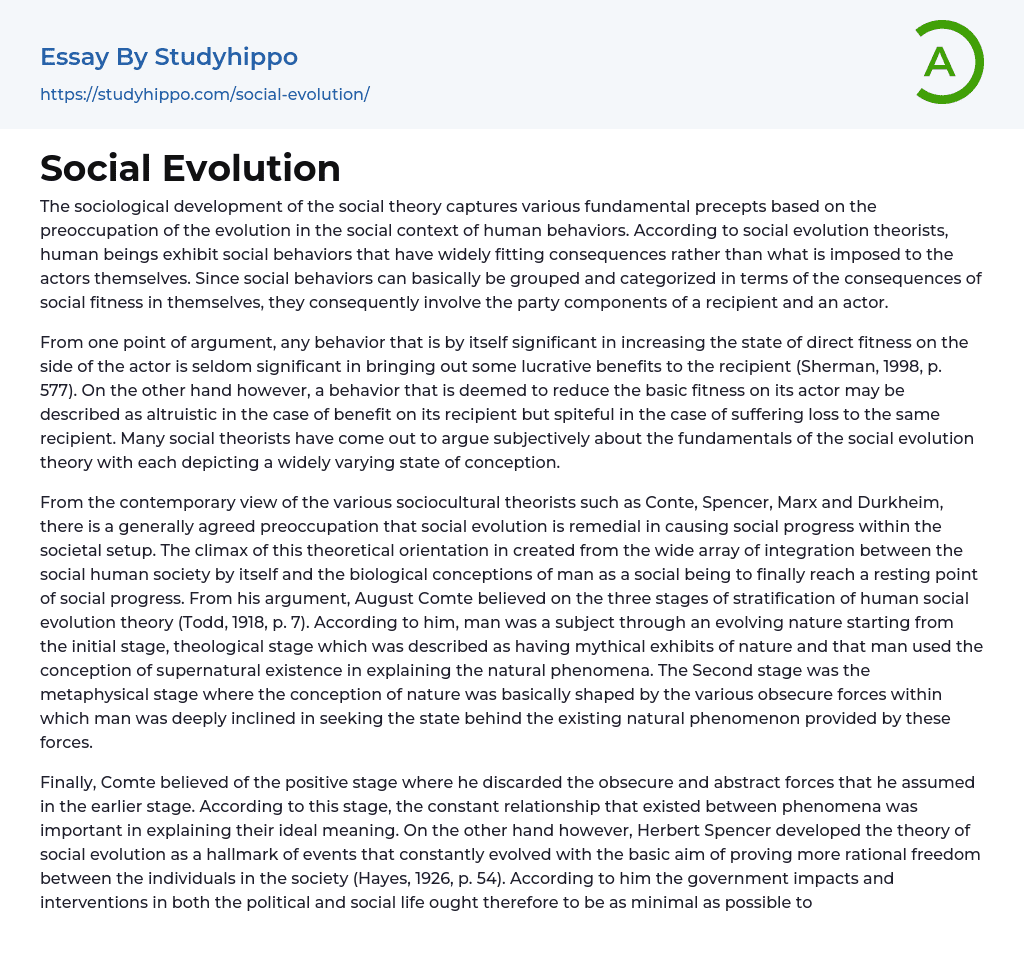The sociology of social theory involves core principles that center around the development of human behavior in a social setting. Advocates of social evolution theory contend that individuals exhibit social behaviors with significant outcomes, as opposed to having behaviors forced upon them. Social behaviors, which can be categorized based on their effect on social fitness, encompass both the recipient and the actor.
According to Sherman (1998, p. 577), behaviors that significantly increase direct fitness for the actor rarely bring any benefits to the recipient. On the other hand, behaviors that reduce the actor's fitness may be considered altruistic if they benefit the recipient, but spiteful if they cause harm to the recipient. Various social theorists have subjective arguments about the fundamentals of social evolution theory, each having different conceptions. Contemporary sociocultural theorists such as Conte, Spencer, Marx, and Durkheim generally a
...gree that social evolution promotes social progress within society. This theoretical perspective integrates the social aspects of human society and the biological nature of humans as social beings to ultimately achieve social progress.
According to August Comte, human social evolution is characterized by three stages of stratification (Todd, 1918, p. 7). In the initial stage, known as the theological stage, man perceives nature through mythical exhibits and explains natural phenomena using supernatural concepts. The subsequent stage, the metaphysical stage, is shaped by the various obscure forces that man believes underlie natural phenomena. Finally, Comte posits the positive stage, where he rejects the abstract forces assumed in earlier stages.
According to this stage, the constant relationship between phenomena was important in explaining their ideal meaning. However, Herbert Spencer developed the theory of social evolution to prove more rational freedo
between individuals in society. According to him, government impacts and interventions in political and social life should be minimal to allow for freedom between different components of society. Spencer believed that contemporary society was shaped in two ways: the industrial society and the military society. The military society aimed to conquer, provide defense, and promote collectivism for a specific group at the expense of the general human fraternity. Conversely, an industrial society focused on trading, production, and decentralization.
It achieved its basic goals through a voluntary collaboration among its members. Emile Durkheim's argument and development of the social progress theory were widely echoed. His argument was rooted in the concept of social solidarity, where the progression of social evolution was described as moving from mechanical solidarity to social solidarity (Watkins, 1998, p. 51). The theoretical foundation of mechanical solidarity suggests that the population within society is largely self-sufficient and there is a low level of integration.
From this perspective, there is a need to use force and repression to maintain unity in society. Organic solidarity entails greater integration, independence, cooperation, and specialization among members of society. Progressing from mechanical solidarity to organic solidarity requires an increase in population and population density. Moreover, there is a need for higher moral density, which involves the development of strong social interactions. Additionally, the population should possess a higher level of specialization. Durkheim believed that labor division plays a fundamental role in social progress (Soto, 2006, p.).
07). Karl Marx, in contrast, posits the concept of social evolution as encapsulated in a tripartite authoritative classification. This classification elucidates how the state of authority and control within society functions as a catalyst for
social evolution. Marx identifies three levels of evolutionary principles: domination, authority, and leadership. The interconnectedness and harmony between these spheres are crucial in establishing a foundational framework for societal evolution. Hence, while drawing upon Durkheim's influential ideas on sociological foundations, we can acknowledge Marx's significant contribution to the rational model of social progress.
According to his theoretical foundation, the fundamental state of variables can highlight this. The concept of mechanic solidarity views the state of human population as self-sufficient with little or no integration between them. This viewpoint suggests a need for repression and the use of force to draw society together. On the other hand, the inorganic component of society in the long run plays an important role in integrating, collaborating, specializing, and fostering cohesion among its party members (Folson, 1928, p. 33).
The long run model of the society shows a higher level of anonymity in cohesion and relationship. As a result, individuals are greatly motivated to alter their behavioral preoccupations to ones that create a better balance between the assumed actors and recipients. Emile Durkheim also includes population density and growth as significant factors that contribute to stronger cohesion among various societal variables. Therefore, it can be subjectively argued that Durkheim presents a more logical argument regarding the theoretical orientation of the social progress theory.
- Age Of Enlightenment essays
- Ethos essays
- Time essays
- Acceptance essays
- Meaning Of Life essays
- Reality essays
- Natural Law essays
- Political Philosophy essays
- Utilitarianism essays
- Existence essays
- Free Will essays
- Good And Evil essays
- Confucianism essays
- Relativism essays
- Conscience essays
- Environmentalism essays
- Empiricism essays
- Epistemology essays
- Ethics essays
- Existentialism essays
- Human Nature essays
- Individualism essays
- Metaphysics essays
- Philosophy Of Life essays
- Transcendentalism essays
- Truth essays
- Destiny essays
- Determinism essays
- Fate essays
- Functionalism essays
- Philosophers essays
- Pragmatism essays
- Future essays
- Child Observation essays
- Critical Reflection essays
- Teaching Philosophy essays
- Personal Philosophy essays
- Action Speak Louder Than Words essays
- Can Money Buy Happiness essays
- Values of Life essays
- Ethical dilemma essays
- Normative Ethics essays
- Virtue Ethics essays
- Belief essays
- Deontology essays
- Moral essays
- Virtue essays
- Work Ethic essays
- Henry David Thoreau essays
- Carl Jung essays




